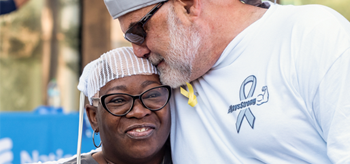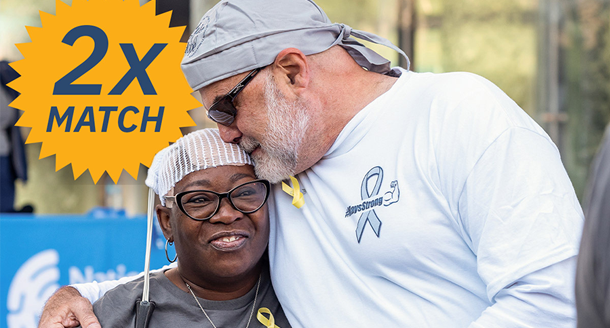My Costa Rican wife, Nidia was diagnosed with a brain tumor, qualified as “terminal” when the UCLA cancer clinic confirmed that her biopsy was of Astrocytoma III.
She was 30 years of age then in 1981. She was able to extend her life 33 more years.
How did she bring this to such fruition, despite all the odds? How much was a blessing?
She was very capable in her metamorphosis with her cancerous pathology, pursuing her sense of purpose and goals with perseverance to: (1) foster what she most wanted with what life she had on Earth; (2) explore a possible ´yes I can try it´ when told ´it can´t be done´ or it is ´not convenient´; (3) co-opt her doctors, this partner, her parents and many other people to help explore these possibilities and accompany her daring effort; and (4) be disciplined with the treatments prescribed and/or found in surfing social networks.
This meant challenging what is taken as “normal”, and looking for more “functional” options for her particular situation. We had to question and even disagree with many common assumptions regarding what is “terminal,” “incurable,” “vegetative,” “deteriorated,” “handicapped,” “disabled” or in “excessive suffering,” utilized too often to denature or stigmatize the patient, or they underestimate and undermine the patient´s intentions, stamina or inner well-being.
We had to deal with two intervals of her episodes, each about 7 years, one of radionecrosis (effects of the radiotherapy manifested years later) and another of vascular dementia. She also had other pathologies, including another brain tumor (meningioma), and during those 33 years, needed 60 imagining tests (MRI, CT, etc.) to diagnosis them.
Doctors consulted in Costa Rica and the United States were very attentive, but at times we had to make recourse to second opinions on line and with medical researchers and practitioners with more effective solutions during my missions for the United Nations to other countries like Canada, Romania and Mongolia. Their contributions contradicted disturbing previous messages of her having dementia, and she was calmed a lot on learning that it was radionecrosis and adjusting her medicine intake.
Fundamental to this is understanding the importance of what is called neuroplasticity, and how with a partial handicap, our cognitive reserve releases potential to develop other individual competences. As Helen Keller shows in her autobiography, being deaf-blind can make one more sensitive and perceptive regarding much that surrounds her than is normal for most people.
Art therapy and imagery helped a great deal. It facilitated overcoming inhibitions to express stressful emotions, preparing for different therapies, and strengthening that plasticity (making us conscious of what we don´t otherwise see or remember or exhibit). In her last phase of episodes, Nidia could be not talking for a couple of days. But then other neurons could be liberated. We took her to a swimming pool exercise group, moved her a bit and before long she was leading the other women singing melodies robustly.
Her approach led to very unusual achievements for brain tumor patients, our always studying the risks involved and her physical, emotional and environmental immunological defenses. We are preparing publications to be more precise regarding those defenses, as much psychosocial as physical, and I can send a summary of them in my conference on psychosocial oncology: warren13@racsa.co.cr. It is so important to take lessons from patients with extraordinary prolongation and quality of life, like those 5-10% of cancer patients in so many clinical tests who live more than three times as long as the average, following the experiment with them. She certainly prepared me better to deal with my prostate cancer.
Among these achievements are the following:
- After the surgery for the brain tumor, Nidia proposed not to take a medical leave from her elementary school teaching. She was told: “But Nidia, the surgery left you paralyzed on the right side of your body, and you must have much rest along with the radio, chemical and occupational therapies.” She responded: “Well, I am left handed. They say the occupational therapy will help restore my right side. The most important therapy for me is to continue with those children as a teacher. Let us see how to conciliate all this.” She continued working as a school teacher for 10 years.
- Love and a sustained sincere tenderness between us became tantamount. Our overnight romance and marriage certainly was jolting to some people close to us, but her very precarious health enabled her to receive much tolerance for this and her other unusual wishes. I lucked into meeting the Costa Rican Catholic Archbishop, who approved our marriage in his and her church, despite my being divorced and of another religion. He might have been aware that he was dying of exactly the same brain tumor pathology as she had.
- Her short term memory became somewhat erratic, and the new school curriculum would be demanding on her as a teacher. But she had lived more than the 5 years generally designated as very exceptional survival with that grade of cancer, and then celebrated surviving 10 years. On learning of her own achievement, she stated her greatest desire, to have her own children. Researching that her control medicines could be very injurious or fatal for a fetus, she slowly reduced and then suspended taking them, monitoring to see how her body and mind reacted. After a miscarriage, we adopted our daughter, and as often happens, this spurred a healthy and easy natural birth of our son, of course after seeking the most recommended gynecologist for managing high risk pregnancies in Costa Rica.
- During her vascular dementia episodes, she showed no pain, not even what was usual in the back of her neck, but rather an impression of being in “nirvana”.Medical journals put the negative on stomach tube feeding, but it was necessary for her survival and it could be managed well enough. She slid rather softly into her last breath.
We had to be very thankful for so many enhancing and unexpected lures and blessings. I miss her tremendously, but am thankful being with her 33 years rather than the predicted one year.




